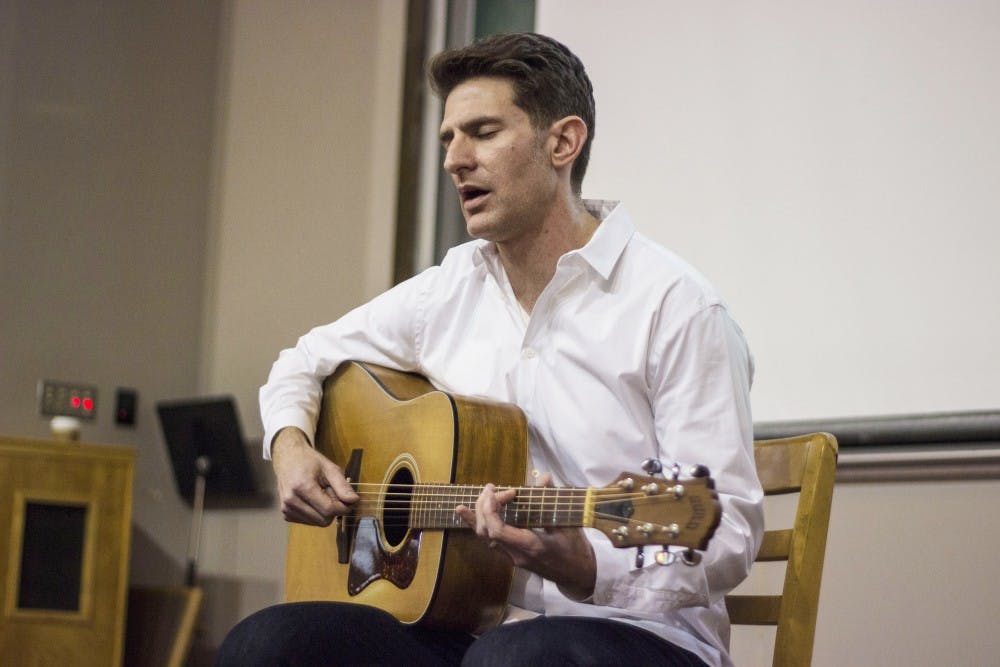Professional musician Joe Goodkin took a seat on a wooden chair in the large lecture hall in Rawles Hall and took his acoustic guitar in hand.
“As Homer would have said before all of his performances, please silence your cell phones,” Goodkin said.
Goodkin performed his original work "The Odyssey: A Folk Opera," for nearly 50 audience members at Rawles Hall on Tuesday afternoon.
The performance was comprised of 24 songs written from the perspectives of the characters in the epic poem the "Odyssey," written by Homer near the end of the 8th century B.C.
Katie DeBoer, a visiting professor in the classical studies department, introduced Goodkin and thanked the department for making the performance possible.
“Joe has merged his love of classics with his love of song to create this folk opera,” DeBoer said.
Goodkin completed a bachelor’s degree in classics from the University of Wisconsin-Madison, and during that time, he took three courses on the "Odyssey," Goodkin said.
“After I got my degree, the story of the "Odyssey" hung with me the most,” Goodkin said.
Goodkin began the event with a short lecture on the "Odyssey" and the oral tradition. He motioned to a drawing of a scene from book eight of the "Odyssey" projected on a screen behind him.
Goodkin discussed how the image depicted Odysseus listening to a bard singing about Odysseus' adventures without realizing Odysseus is in the room. In the drawing, Odysseus is so moved by the story he covers his face with his cloak to hide his tears and to keep from being discovered.
“The hero of the song is listening to a song being sung about himself,” Goodkin said. “It is a very self-aware text, and very modern in that way.”
Goodkin said he is interested in this drawing because the "Odyssey" began as an oral story sung by bards, and this drawing depicts that very tradition. Goodkin said through this performance, he wanted to recreate the oral tradition and get away from the written word.
Goodkin also pointed out the king in the drawing who glances at Odysseus and tries to figure out why Odysseus is crying.
“When you perceive stories, you have your own reactions, and you have reactions to other people's reactions when you are in a group listening to a story,” Goodkin said.
Goodkin moved on and said this is his 258th time sharing the folk opera as a modern bard. Goodkin also said his first public performance of this piece was at IU in April 2002.
Goodkin explained the performance is demanding and asked the audience to be as quiet as possible. The first song he played was called “Who am I.” This song is the invocation of the opera. Goodkin later explained every epic poem begins with an invocation in which the poet asks a muse for inspiration.
“Who am I? Mind on fire. Born of you, but who am I?” Goodkin sang.
To mark the transition to the next song, “On My Way,” Goodkin struck a dissonant chord. This song was written from the perspective of Telemachus as he seeks news of his father Odysseus.
“Oh mother, now’s my time, oh mother, I’ve seen the sign and I’m off,” Goodkin sang.
Aside from pausing to hit the guitar for percussive elements, Goodkin played for 30 minutes straight to complete the performance. His voice carried throughout the hall, despite not having a microphone, and he kept his eyes closed the entire time.
Goodkin’s songs progressed in the order of the events in the original poem and represented the perspectives of Odysseus, Penelope, Telemachus, Athena and the blind poet in the form of soliloquies.
Goodkin said he wrote these songs with the guitar tuned in an unusual way, and had to relearn the guitar for this project.
“We don’t know exactly what ancient instruments sounded like,” Goodkin said. “I wanted the guitar to sound permanently dissonant.”
The performance ended with Goodkin leaning silently over his guitar. After a long pause, he looked up and the audience applauded.
A student asked Goodkin if he will use this format to perform any other classical pieces of literature and Goodkin said he had recently thought of it.
“The muse spoke to me about a way to do something similar to this with the 'Iliad',” Goodkin said. “Stay tuned for a prequel or sequel by 2020."




